Mosquito bites: How do they choose their victims and how can you protect yourself?
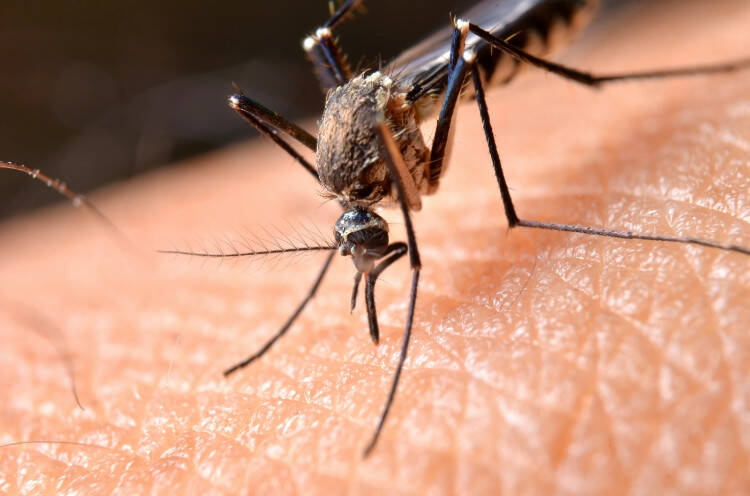
They come with the warm days of summer. Like humans, they love sun, heat and water. They attack from dusk to dawn.
Article content
That's to let us know they've chosen us as their victim.
They suck our blood, mark us with stings and annoy us with unpleasant itching.
Where do they most often hang out?
Why do they attack us?
Who is the best prey for them and how to defend against them? Read on...
Mosquitoes, definition and danger level
The mosquito (Culicidae) is one of several thousand species of insects.
Similarly, mosquito species number in the thousands.
They have been with us for more than 226,000 years. They vary in size. However, they do not exceed 16 mm and weigh up to 2.5 g.
Their body consists of a head (eyes, snout, antennae), abdomen and buttocks. They are bipedal because they have a pair of blanched wings and three pairs of legs.
They are very good long-distance fliers. They can fly up to 10 km at night and can stay in the air for up to 4 hours without a break.
They can fly at speeds of 1-2 km/h, during which they emit a whistling buzz, caused by the wings rubbing together and the vocal cords.
The female can flap her wings up to 500 times per second.
Let's take a look at all the summer problems together:
Our health in summer - sun, heat, injuries and illness
How does mosquitoes' body structure help them find prey?
Mosquitoes have single eyes on the front of their heads and compound eyes on the sides, which provide them with mosaic vision. This is less sharp than human vision, but they are much better at perceiving movement in their surroundings and have a larger field of vision.
They are also good at distinguishing colours, which helps them to better navigate their way around a given space.
They have a well-developed auditory and olfactory system, through which they can smell odours that are attractive to them (human sweat, lactic acid) but also repulsive. They can smell their prey from a distance of about 50 m.
Mosquito bites
Although thebite becomes red, swollen and itchy, it stops after a short time.
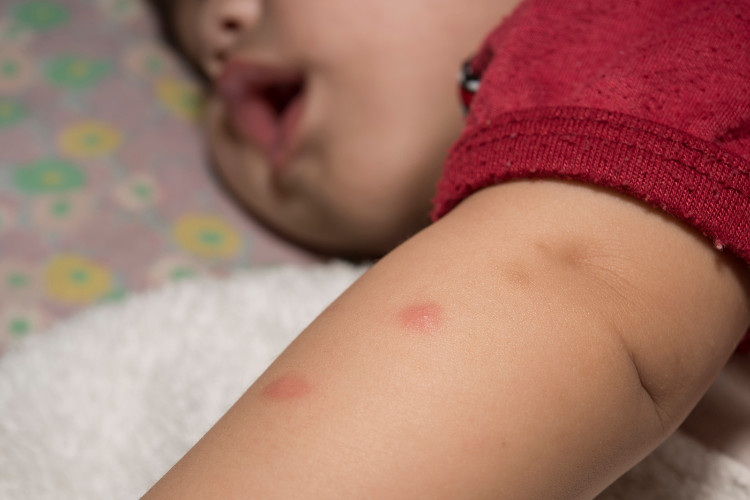
Symptoms of mosquito bites:
- Local redness of the skin.
- a soot spot in the centre
- slight protrusion above the skin level
- swelling
- itching
- pain
- allergy symptoms
- manifestations of other infections
Lyme disease and heartworm disease have been reported in Europe. Heartworm disease is a parasitic disease that usually affects animals (cats, dogs). It is transmitted by mosquitoes to humans and is often fatal.
Danger level of mosquitoes in the world
Tropical mosquitoes are the most dangerous species of mosquitoes that we can come into contact with, for example, when travelling to exotic countries. The insidiousness lies in the fact that they are often infected and their bites are a way of transmitting dangerous diseases.
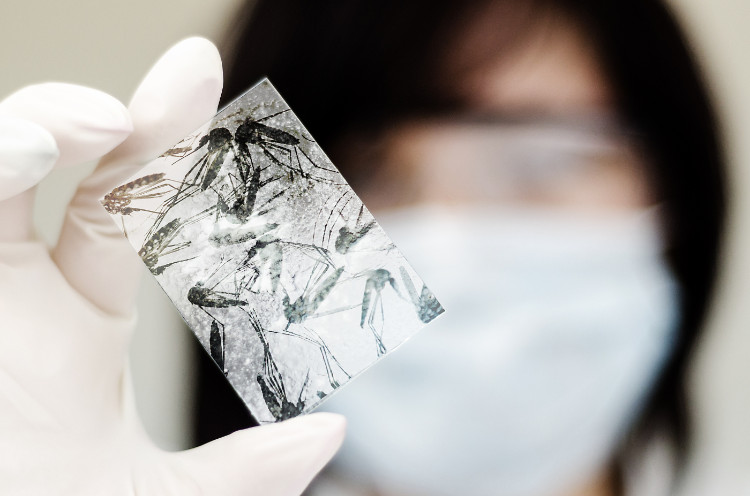
Interesting fact: Mosquitoes that were originally only found in Africa or Asia are moving towards Europe due to global warming.
Among the most dangerous species are the Aëdes Aegypti, which transmits Chykungunya haemorrhagic fever, Dengue, yellow fever, and the Zika virus. Another is the Anopheles mosquito, which is responsible for malaria. There are countless dangerous mosquitoes. They cause many diseases, including the ones mentioned above. Also Papatasi fever, Oroya, Rift Valey and others.
Who is drinking our blood?
Mosquitoes are one of the ectoparasites that suck the blood (haematophagy) of humans as well as other warm-blooded animals. Specifically, we are talking about the female mosquito that needs it as a source of protein for her eggs.
The male mosquito never sucks blood, it feeds on nectar.
It's not easy to distinguish females from males, at least not with the naked eye.
The females have a hairless snout, which also gives them better hearing. The female's mouthparts are smooth, allowing her to penetrate the skin, suck blood and inject saliva into the wound.
What does mosquito saliva contain?
- molecules that reduce blood clotting
- pain-reducing molecules after injection
- viruses
- bacteria
- parasites
Most common mosquito sites
Mosquitoes love the heat. Their incidence is increased in the summer months, especially from April to September. These nocturnal creatures stay in cooler places during the day and come at night in search of light, warmth and food.
Standing water and flooding
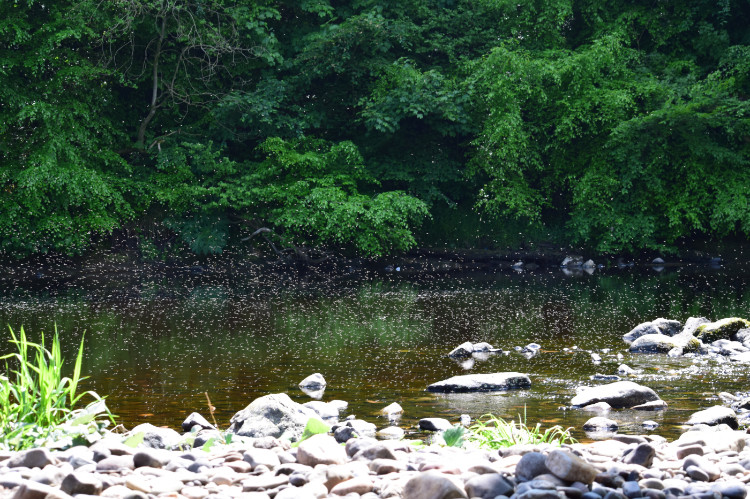
They are most commonly found in tropical and temperate climates. However, they are very adaptable and can survive in all zones on every continent of the world.
They are mainly found near bodies of water with dense vegetation. They prefer stagnant water such as lakes, reservoirs, pools, and even water barrels. One of the main reasons for this is that they lay their eggs in clusters on bodies of water. Even a small puddle can serve as a hatching ground.
Interesting: Mosquito eggs have the ability to hibernate. They survive for several years after the river has dried up. They can return to develop again in the event of repeated rains or floods.
The rainy season is the most popular time for mosquitoes, when they become overabundant. For example, floods can cause an overpopulation of mosquitoes, which, together with warm weather, are a paradise for them.
On what basis do mosquitoes choose their victims?
Were you bitten more than others as a child? Then you must have heard from an older relative that you have sweet blood. But that's just a myth.
For years, scientists have been trying to figure out what makes a mosquito choose its victims. Some findings have been proven, others are just conjecture.
There's still speculation about vitamin B deficiency. Is it attractive to mosquitoes? We don't know yet.
What do mosquitoes prefer?
Based on years of study and observation, we can say with certainty that mosquitoes choose their prey.
- Blood type 0 (less A, they don't like B)
- human warmth (alcohol increases blood flow, temperature)
- Human sweat (contains bacteria and lactic acid)
- carbon dioxide (in the exhaled air)
Thus, people who meet most of these conditions are most at risk. By eliminating risk factors and conditions suitable for mosquito attack, we also eliminate the number of bites.
- dwellings near bodies of water
- unventilated rooms (carbon dioxide)
- blood group 0 and A
- elevated body temperature
- Alcohol
- exercise (sweat, carbon dioxide)
- disease causing increased sweating (thyroid)
- obesity
- pregnancy
Home tips and tricks to protect yourself from mosquitoes
Getting rid of a pesky visitor may sometimes not be as easy as it seems. These hardy creatures wait in the dark for their opportunity. However, there are some smells that not only bother them, but outright repel them.
Do your feet stink after a hard day? You're in business. Mosquitoes hate that smell. And not just them.
Protective measures against mosquitoes
Mosquito protection measures should not be neglected, especially in high-risk areas or during periods of mosquito overpopulation or increased mosquito incidence. They are not complicated, they don't take much time and you will be satisfied with the result.
- Do not open a window in the evening if you have a light on
- use mosquito nets
- impregnate the nets with insecticide
- mosquito netting (netting around the bed) is suitable in high-risk areas
- use repellents (natural, synthetic)
- put an electric repellent in the plug at night (they contain insecticidal vapours)
- light a scented stick
Scents that repel mosquitoes
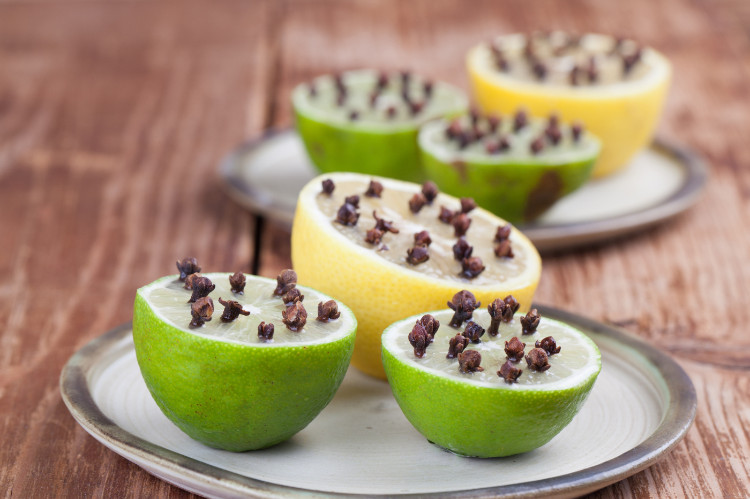
Mosquito-repelling scents can be used in a variety of ways. You can rub them on in the form of essential oils, light a candle or light a scented stick to scent your room.
They guarantee you a restful sleep and mosquitoes a failed hunt.
- The scent of garlic
- Lemon scent (citronella scented candle)
- mint scent
- eucalyptus scent
- scent of tea tree oil
- lavender scent
What works for clefts?
A mosquito bite is actually a local reaction of our immune system. Rarely does a more severe allergic reaction occur. The result is local redness of the skin, slight swelling and an uncomfortable itching sensation.
What really helps?
- Ice cube (reduces pain and itching, reduces swelling and inflammation)
- fenistil or other medicine (reduces inflammation, swelling, itching, prevents allergies)
- liquid powder (relieves itching, inflammation and swelling)
- normal or apple cider vinegar (mild swelling and itching)
- honey (antiseptic and soothing)
- lemon or lime (relieves itching)
- mint and eucalyptus (relieves itching)
- aloe (relieves inflammation)
- tea tree oil (relieves inflammation)
Itching is usually what alerts people to mosquito bites in most cases. It makes us feel uncomfortable and makes us scratch. However, scratching causes localised blood circulation in the skin, which worsens the inflammation. Therefore, it is advisable to hold on, not scratch and use an insect bite cream, an anti-allergy or anti-inflammatory cream or one of the tried and tested home recipes.
Related










